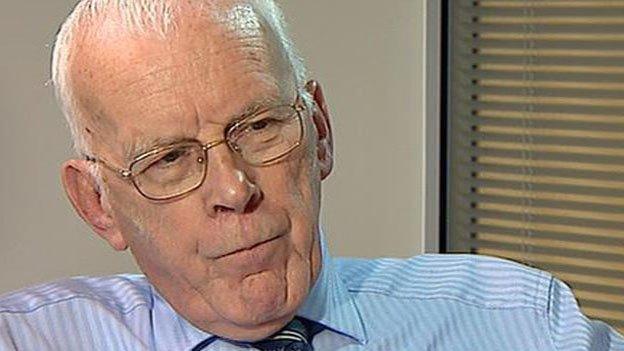Scottish independence: Sir Ian Wood issues warning over oil predictions
- Published

Sir Ian Wood recently headed a major oil industry review
A leading oil industry figure has claimed that the Scottish government's predictions for North Sea oil recovery are up to 60% too high.
The figure of 24bn barrels is quoted in the White Paper, external as an estimate from industry body Oil and Gas UK.
But Sir Ian Wood estimated production would be down to a sixth of the current levels by 2050.
Scottish Energy Minister Fergus Ewing said the comments did not cast doubt on "the huge scale" of energy reserves.
Sir Ian claimed there are about 15bn to 16.5bn barrels of recoverable oil left, and that the figure from the White Paper is 45% to 60% too high.
He believes that unless significant new discoveries are made, no more than 35 years of oil and gas production remain and that this must be taken into account in the economics of independence.
'No allegiance'
Sir Ian said: "The loss of significant offshore oil and gas tax revenues as the North Sea runs down will have a big impact on our economy, jobs and balance of payments, with significant increases in household energy bills - and a very adverse impact on the legacy for future generations in an independent Scotland."
He explained: "It means our young voters must be fully aware that by the time they are middle aged, Scotland will have little offshore oil and gas production and this will seriously hit our economy, jobs and public services.
"What's more, the rundown impact will begin to be felt by 2030, which is only 15 years from now."
Sir Ian added: "I have no allegiance to any party or campaign. I am proud to be both Scottish and British."
Sir Ian spoke to BBC Scotland as he said he had found himself "reluctantly drawn into the public debate" on independence following an interview for news site Energy Voice, external.
First Minister Alex Salmond has previously said the industry had "a strong and stable future in an independent Scotland".
Following Sir Ian's comments, Energy Minister Fergus Ewing said there is "a wealth of expert opinion on the huge scale of Scotland's long-term oil and other energy reserves".
He added: "This is ultimately a debate about exactly how big Scotland's remaining oil reserves are, and most countries are not nearly lucky enough to be in that fortunate position.
"The estimate of up to 24bn barrels of oil remaining is the industry's own projection - and Sir Ian's own recent report also referenced the remaining reserves in the North Sea as being up to 24bn barrels, meaning there is potentially as much still to come in value terms as has already been extracted."
'Six times higher'
Earlier this week, a report said future North Sea oil and gas revenues could be six times higher than a UK economic watchdog had forecast.
The UK Office for Budget Responsibility (OBR) has forecast North Sea revenues of £61.6bn between 2013/14 and 2040/41, but N-56 said the figure could be as high as £365bn, if a series of recommendations were implemented.
N-56 was founded by Dan Macdonald, who is a member of the advisory board for Yes Scotland, which is campaigning for independence.
A spokesman for the group said: "N-56 welcomes Sir Ian Wood's confirmation that recoverable oil is far higher than the OBR estimates, as set out in the N-56 report launched earlier this week."
Better Together leader Alistair Darling said: "Coming from such a respected internationally renowned expert on North Sea oil, this news fatally undermines what Alex Salmond has been saying about oil and completely vindicates our analysis.
"Sir Ian Wood's comments blow apart Alex Salmond's plans for funding schools and hospitals. It is devastating for his ridiculous claims on pensions and on jobs.
"Alex Salmond has acknowledged that Sir Ian Wood must be listened to when he is talking about North Sea oil."
Sir Ian Wood retired from his role as chairman of Aberdeen-based oil services firm Wood Group in 2012.
He had been chairman of the company since 1982 and served as its chief executive from 1967 to 2006.
Sir Ian recently headed a major review for the UK government looking at how oil recovery in the North Sea could be maximised.
Voters in Scotland go to the polls on Thursday, 18 September, when they will be asked the "Yes/No" question: "Should Scotland be an independent country?"